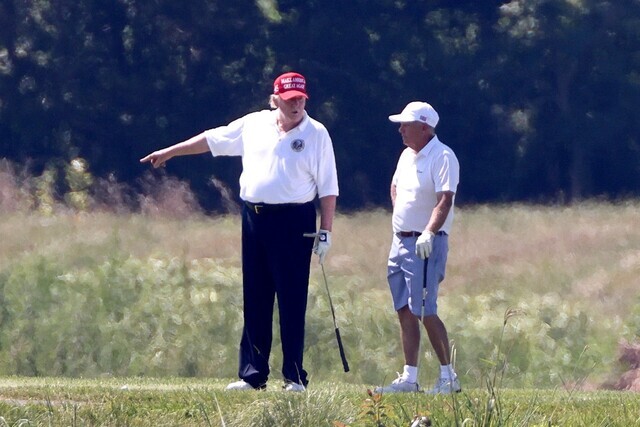hankyoreh
Links to other country sites 다른 나라 사이트 링크
[Editorial] S. Korea needs to stand firm against Trump’s unreasonable demands and rumors of a USFK reduction

The unreasonable demands of US President Donald Trump have left South Korea and the US without a defense cost-sharing agreement for seven months, and now more rumors have emerged about the US possibly reducing its troop presence on the Korean Peninsula, apparently in a bid to force South Korea to increase its defense contribution.
In a July 17 document about implementing the National Defense Strategy, US Secretary of Defense Mark Esper said that the US would be carrying out an assessment over the next few months about redeploying American troops in the Indo-Pacific Command, which includes US Forces Korea (USFK). On the same day, the Wall Street Journal quoted US government officials as saying that the Pentagon had submitted a report to the White House in March about redeploying American forces stationed overseas. One option in the report is paring down the size of USFK.
Responding to queries from the South Korean press, a senior official in the US government reiterated the US demand for South Korea to shoulder a bigger share of the defense burden without taking a clear stance on the potential USFK reduction. The official noted that Trump has made clear he expects US allies around the world, including South Korea, to make a bigger contribution.
South Korean and American negotiators came to a tentative five-year arrangement under which South Korea would raise its cost-sharing contribution by 13.6% this year, with the contribution reaching US$1.3 billion by the fifth year of the agreement. But Trump demanded that South Korea immediately raise its contribution to US$1.3 billion, a 50% hike, leaving the negotiations in an impasse.
There has been ongoing speculation that Trump could threaten to reduce the US troop presence in South Korea, which currently stands around 28,500, if South Korea doesn’t agree to increase its contribution by the amount he wants. While Trump denied in April that there was any link between the cost-sharing negotiations and a USFK reduction, it’s still conceivable that he could suddenly raise the possibility of a troop reduction to consolidate his support base, which is opposed to stationing American troops overseas. If he can force Seoul to consent to a much higher cost-sharing contribution, it would give him something to brag about in his campaign for reelection in November, especially considering that he’s currently up against the ropes. Last month, Trump decided to bring home 9,500 American troops from Germany, where 34,500 are currently stationed, to protest what he sees as Germany’s low level of defense spending.
The South Korean government needs to keep a cool head as it follows developments while standing firm against the Trumpian predilection to treat allies as the objects of bullying and bargaining. It would be illogical for the US to reduce its garrison in South Korea, which is a critical part of the Indo-Pacific Strategy that the US has developed to contain China. Serious concerns have also been raised in the US Congress about the Trump administration’s attitude toward USFK and defense cost-sharing. Another important variable is the outcome of the US presidential election. We hope that the South Korean government will work on an effective response while sticking to its guns in the negotiations.
Please direct comments or questions to [english@hani.co.kr]

Editorial・opinion
![[Column] The state is back — but is it in business? [Column] The state is back — but is it in business?](https://flexible.img.hani.co.kr/flexible/normal/500/300/imgdb/original/2024/0506/8217149564092725.jpg) [Column] The state is back — but is it in business?
[Column] The state is back — but is it in business?![[Column] Life on our Trisolaris [Column] Life on our Trisolaris](https://flexible.img.hani.co.kr/flexible/normal/500/300/imgdb/original/2024/0505/4817148682278544.jpg) [Column] Life on our Trisolaris
[Column] Life on our Trisolaris- [Editorial] Penalties for airing allegations against Korea’s first lady endanger free press
- [Editorial] Yoon must halt procurement of SM-3 interceptor missiles
- [Guest essay] Maybe Korea’s rapid population decline is an opportunity, not a crisis
- [Column] Can Yoon steer diplomacy with Russia, China back on track?
- [Column] Season 2 of special prosecutor probe may be coming to Korea soon
- [Column] Park Geun-hye déjà vu in Yoon Suk-yeol
- [Editorial] New weight of N. Korea’s nuclear threats makes dialogue all the more urgent
- [Guest essay] The real reason Korea’s new right wants to dub Rhee a founding father
Most viewed articles
- 1[Column] Why Korea’s hard right is fated to lose
- 2Amid US-China clash, Korea must remember its failures in the 19th century, advises scholar
- 3[Column] The state is back — but is it in business?
- 460% of young Koreans see no need to have kids after marriage
- 5Trump’s talk of flouting NATO promises sparks apprehension in Seoul
- 6[Column] Can Yoon steer diplomacy with Russia, China back on track?
- 7[Guest essay] Maybe Korea’s rapid population decline is an opportunity, not a crisis
- 8South Korea officially an aged society just 17 years after becoming aging society
- 9[Guest essay] The real reason Korea’s new right wants to dub Rhee a founding father
- 10AI is catching up with humans at a ‘shocking’ rate